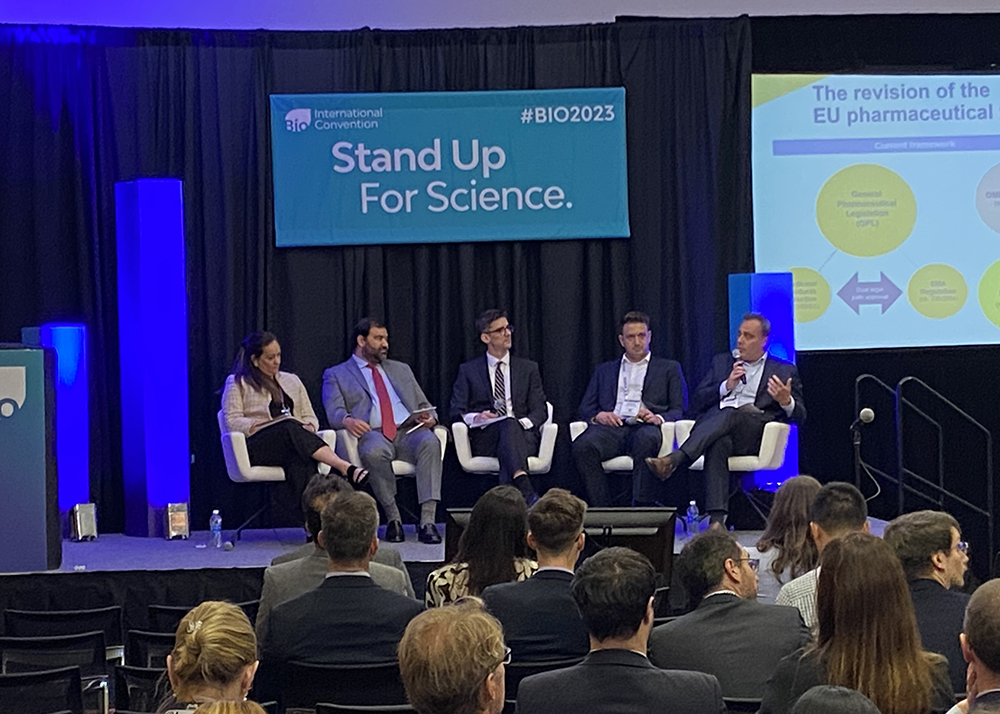A proposal to provide the first overhaul of European Union pharma regulation in 20 years takes some positive steps but would still leave a lot of obstacles to innovation, a panel of experts agreed at a June 5 session on the opening day of the 2023 BIO International Convention.
The new regulations ultimately threaten to reduce access to medicines for Europeans by discouraging drug developers from entering the market, said members of the panel on The New European Pharmaceutical Landscape, which was moderated by Matias Olsen, Public Affairs and Policy Manager at EUCOPE.
“Companies are worried about access to the market,” said Hilary Stiss, Biotechnology Innovation Organization (BIO) Senior Manager for International Affairs. “Small companies look at the European market, and it’s intimidating.”
Uncertainty over exclusivity
In his overview of the proposed new EU Pharma Directive and related legislation, Alexander Natz, EUCOPE Secretary General, told the panel the legislation would create a complex system for determining the exclusivity periods of new drugs that are introduced to the market.
Factors such as orphan-drug qualification, being able to launch in all 27 EU countries, and meeting an unmet need are used to determine how long a new drug enjoys exclusivity, without generic or biosimilar competition, according to Natz. Exclusivity would typically range from 8-13 years, and the variables in this calculation create uncertainty for anyone considering investing in a new drug, he said.
“It’s getting increasingly complicated for investors to know: What is my exclusivity period?” Natz said.
This is especially true because qualifying for longer exclusivity could be quite difficult, other panelists said.
For instance, the proposed requirements for achieving classification as a drug that meets an unmet need are far too narrow, and were developed without input by patients or industry, according to Nicholas Cosenza, Senior Manager Government Affairs at Amgen. “That is definitely something we’re concerned about,” he said.
Another factor that impacts exclusivity—introducing a drug in all 27 EU countries—can be difficult for a small company to achieve, Stiss noted. “We need to make sure that we keep the ecosystem strong, and that small companies can go it on their own,” she said.
Natz agreed, arguing that patients will benefit from greater access if new drugs can enter one market at a time instead of struggling to meet the requirements of all 27 EU states just to gain additional exclusivity.
“We have to make sure we are not putting in too many conditions and obligations in terms of launching,” he said.
Regulations streamlined
Among the bright spots in the proposed legislation is an effort to streamline regulation, according to Cosenza. “When we look at the changes and the parts that really speed up access, we look at the changes to the regulatory system as being positive,” he said.
Natz said the regulatory change should lead to faster approval for effective new drugs by essentially combining the approval processes for the European Medicines Agency (EMA), pediatric medicines, and orphan drugs that treat rare diseases into one process.
Cosenza also praised the proposed creation of a “regulatory sandbox,” an innovative approach to allow for temporary approval for new medicines while real-world evidence is gathered to confirm their efficacy.
Another area that is being streamlined is in health technology assessments (HTAs), which are currently conducted by individual countries, but would instead be conducted once at the EU level under proposed changes, said Fabian Berkemeier of the IGES Institut. “Having a central entry pathway and having a central procedure is huge,” he said, and has the potential to greatly ease market regulation.
Unfortunately, Berkemeier said, “market access remains national,” because different countries have different rules. For instance, the price of a drug is a big factor in gaining entry to Germany, which has strong drug price control regulations.
Natz argued that is essential that the biotech industry and its representatives work to insert practical considerations into the final development of HTA regulations and other EU legislation impacting biotech. “It’s really important that the industry speaks with one voice” on these issues, he said.




